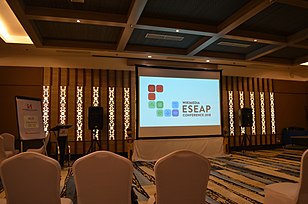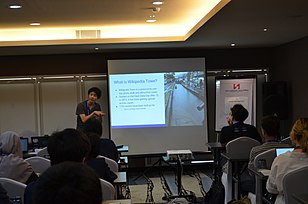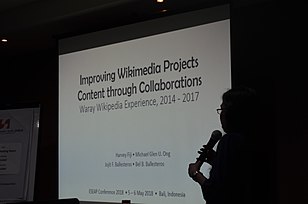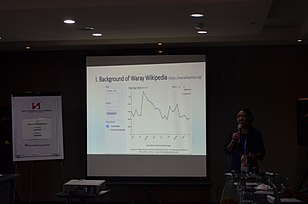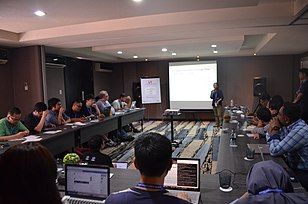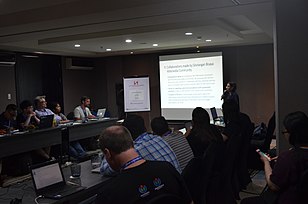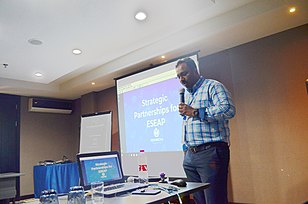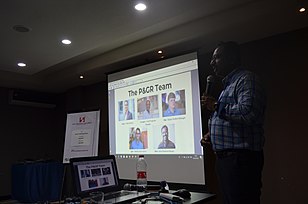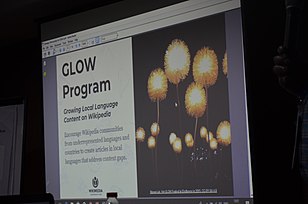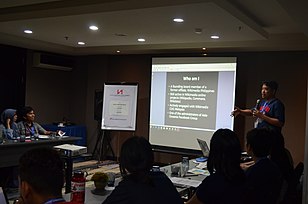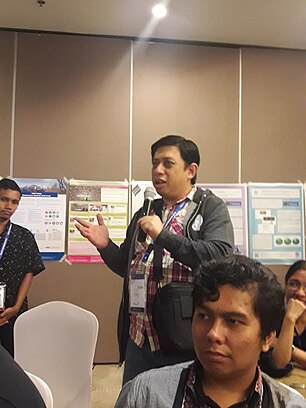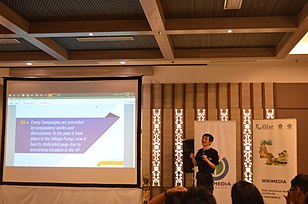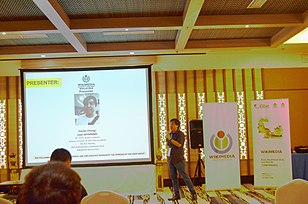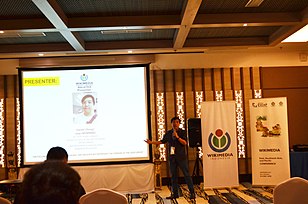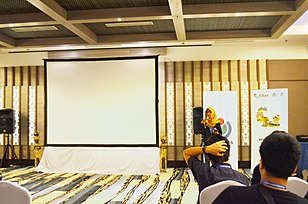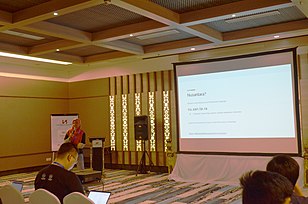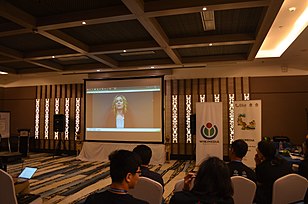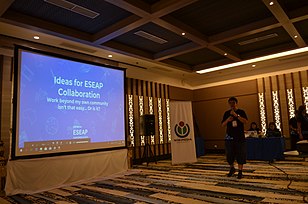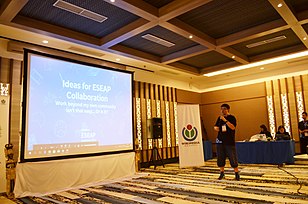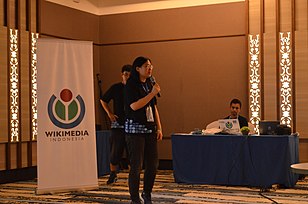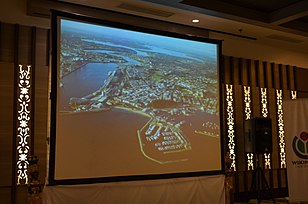User:Jojit fb/ESEAP Conference 2018 Report
| Scenes before event started and during the sessions attended by Jojit |
First day |
|
|
|
|
|
|
|
|
|
|
|
|
|
|
|
|
|
|
|
|
|
|
|
|
|
|
|
|
|
|
|
|
|
|
|
|
|
|
|
|
|
|
|
|
Second day |
|
|
|
|
|
|
|
|
|
|
|
|
|
|
|
|
|
|
|
|
|
|
|
|
|
|
|
|
|
|
|
|
|
|
|
|
|
|
|
|
|
- For questions, comments and reactions regarding this report, go to the talk page.
Jojit Ballesteros, a veteran Filipino Wikimedian, attended the Wikimedia movement's first ever ESEAP Conference 2018 last May 5 to 6, 2018 at Bali, Indonesia. This page serves as his official ESEAP Conference 2018 Report that discusses his experiences during the said regional conference for Wikimedia communities and affiliates in the East, Southeast Asia, and Pacific or ESEAP. The event was hosted by Wikimedia Indonesia (WMID) and funded by the Wikimedia Foundation (WMF). It was organized by WMID and several Wikimedia volunteers across the region. Those who wanted to attend the conference were required to apply for a scholarship. Therefore, all of the successful participants, including Jojit, were given scholarship covering airfare and accommodation.
As Jojit wanted to share his experiences during his outreaches in the Philippines, he submitted a presentation for the conference and it was accepted by the ESEAP 2018's Program Committee as one of the breakout session topics for the first day of the conference. His presentation is entitled Conducting a successful edit-a-thon, which tells his personal experiences on holding edit-a-thons in the Philippines.
Journal
editMay 4, 2018
editOn the day before the conference, Jojit Ballesteros together with his wife, Bel Ballesteros left their home and went to the Ninoy Aquino International Airport, Pasay City, Philippines where they met the two other Filipino Wikimedians Maffeth Opiana and Irvin Sto. Tomas who are both from the PhilWiki Community. They boarded the same flight going to Bali, Indonesia as they were all attendees of the ESEAP Conference 2018. After approximately four hour air travel from Manila to Bali, they safely arrived at Ngurah Rai International Airport, Bali, Indonesia where they were welcomed by Ivonne Kristiani and Rachmat Wahidi from Wikimedia Indonesia (WMID).
They have also met other attendees of the conference from other countries at the Bali airport. They all entered a van that transported them to the Swiss-Belresort Watu Jimbar, which was the venue of the conference and also served as the lodging for the participants. At the hotel, they were greeted by Nurleni Noertam and other people from WMID. Afterwards, Jojit and Bel stayed and slept in the room as assigned by the organizers.
May 5, 2018
editIn the morning of the first day of the conference, Jojit and Bel went to the main room of the conference, the Jimbar Ballroom, to register. Since the conference was not yet officially started, they introduced themselves and talked to other attendees from different countries. Specifically, they had long conversations with Bonaventura Aditya Perdana and Dimas Agus Putera Hardijanto. Later on, Jojit saw a table for sweets and souvenirs that was arranged according to the country of origin. The table was set up to accommodate those sweets and souvenirs given by the participants for other participants as token of goodwill. He went back to his room to get the Philippine souvenirs that he and Bel bought for the participants of the conference. Upon returning to the Jimbar Ballroom, he laid down those Philippine souvenirs on the table consisting of postcards, key chains and bracelets.
When the conference officially started, one of the first activities was the ice breaker. The conference facilitator, Idaman Andarmosoko of Jakarta, Indonesia, grouped the participants randomly with the help of pieces of paper attached to each of the bottom leg of the chairs where the name of a group was written there. Each person got a paper on the chair where they were sitting and the group that each of them belonged was based on what was written on the paper. After all were grouped, each person in the group would introduce someone based on the format that was also written on the paper. Some groups have three or four members but Jojit belonged to the group named Komodo with only two members. Jojit was with Chris Antonio from Perth, Australia as his only group mate. After all participants were acquainted, each of them introduced someone from their group at the assembly. When it was the time for Komodo group to tell something about each of their members, Chris presented Jojit first and then Jojit presented Chris.
After the event's opening ceremony and introduction, the first breakout sessions began at Zanoor 1 and Zanoor 2 rooms. Zanoor 1 was allotted for community advancement topics while Zanoor 2 for community development. At Zanoor 1, the activities were combined as talks and discussions for community outreach. According the program, Takashi Ota from Japan would speak first about helping new contributors to write articles and it would be followed by the Jojit's talk about conducting a successful edit-a-thon. In actuality, Jojit spoke first and then followed by discussions and questions of his talk. The next speaker was Takashi who presented his topic and after which, there were also discussions and questions related to his presentation.
After the Community Outreach breakout session, there was a lunch break. During lunch, Jojit was with the other four Filipino delegates (Bel, Irvin, Maffeth, and Butch Bustria). At some point during lunch, Jan Gerlach, Public Policy Manager of the Wikimedia Foundation (WMF), joined them and they had a short chat with him. Afterwards, Jojit attended the next breakout session at Zanoor 2, which was about initiating partnership and collaboration. Just like with the other breakout sessions including the succeeding sessions, every talk was followed by discussions and questions. For the first talk of this breakout session, Bel spoke about collaborations done in Eastern Visayas that improved content in Wikimedia projects specifically the Waray Wikipedia. The next speaker, Eun-Ae Gu from the Wikimedians of Korea User Group, discussed about sharing public information in cooperation with the South Korean government. The last speaker for the session, Ravishankar Ayyakkannu from the WMF, talked about the strategic partnership in the ESEAP region.
The next breakout sessions began and Jojit entered Zanoor 1 to attend the workshop on Education Program Planning and Evaluation that was facilitated by Nichole Saad from the Wikimedia Foundation. She was the only speaker for this session. Jojit participated in group work and discussions of the workshop. There was another break after Nichole's session and then Jojit was there at the next breakout session at Zanoor 2. The topics for this breakout session were about ups and downs of organizations. The first speaker for this session was Tze-wen Wang (a.k.a. Reke Wang) from Wikimedia Taiwan and he talked about the composition and structure of the board of a chapter. The next speaker was Butch Bustria, a Singapore-based Filipino Wikimedian, and he gave reasons on making a Wikimedia affiliate sustainable.
The last session of the day was a plenary that was held at the Jimbar Ballroom where Erick Guan from Wikimedia User Group China reviewed the results of the Wikipedia Asian Month. After the plenary session, participants were advised to prepare for the last activity of the day, which was to watch the "Kecak Dance" performance at Uma Dewi Stage, Kota Denpasar, Bali, Indonesia. The stage is located around 4.6 kilometers from the venue and all conference attendees rode buses to get there as arranged by the organizers. It was already evening when they arrived at Uma Dewi Stage. Since the performance is open to the public, there were other people aside from the ESEAP attendees who watched the Kecak Dance, which is actually a Balinese dance and music drama.
Upon returning to the hotel, the participants had dinner. Jojit was at the dinner table with the other Philippine delegation and the Wikimedians in Thailand. Afterwards, Liang-chih ShangKuan of Wikimedia Taiwan conducted an ice breaker. It was another get-to-know-you type of ice breaker named Human Bingo. The ice breaker is just like the game Bingo. The difference is that interesting facts are written on the Bingo boxes instead of numbers. Some of the facts written in the boxes include "have been in Wikimania," "an affiliate board member" and "a Wikimedia Foundation staff." Each participant were given a sheet of paper with these kind of questions, which served as their Bingo card. The objective of this game is to gather signatures from the participant who fits the description written on each of the box. In some situations, the winner of this game is the one who filled out all the boxes but Liang opted to apply the usual rule, which is completing either vertical or horizontal rows only. Jojit wasn't able to complete a row but there were several winners. The first day of the conference ended after this activity but some people continued to socialize after the ice breaker.
For additional things happened during the first day of the conference at the perspective of Jojit, refer to the First day section below.
May 6, 2018
editIt was pass 9:00 am when Jojit arrived at the Jimbar Ballroom to attend the second day of the ESEAP conference. Although he was a bit late, the sessions were not yet began. The facilitator, Idaman, was just giving the rundown of the things to expect for the second day when Jojit came. The first activities for the day were the lighting talks where speakers were given very short time for presenting their topic.
The first speaker was Rachmat Wahidi from WMID who discussed about working with GLAM (galleries, libraries, archives, and museums) institutions in Indonesia. This was followed by Irvin Sto. Tomas from the PhilWiki Community and he presented the Bikol Wikipedia as local resource. Leung Chung-ming, also known as Spring Roll Conan, who is an administrator of the Chinese Wikipedia came next to speak about the administering the Chinese Wikipedia and its activities. After this talk, Daniel Chong Choon Yuen of the Wikimedia Community User Group Malaysia showed the history and status of Wikipedia in Malaysia. This was succeeded by another speaker from the WMID, Nur Rahmi Nailah, who is also a Javanese Wikpedian and she explained about the development of the Javanese Wikipedia and its community. Then, Nur Fahmia who is also an editor of the Javanese Wikipedia and from WMID followed next as speaker for the topic about the challenges of local languages in Wikipedia and Nusantara (a contemporary Malay term for the Malay Archipelago and Indonesian Archipelago). Finally, the last speaker for the lightning talks was Athikhun Suwannakhan from the Wikimedians in Thailand User Group and he talked about the three-year experience of the Wikipedia Education Program in Thailand.
When the lightning talks ended, a taped video message of the Wikimedia Foundation's Executive Director Katherine Maher for the conference was played and wished for a successful event. It was supposed to be played on the first day of the conference but due to technical problems, it was finally shown on the second day. After the recorded video was played, all attendees gathered for a group picture. They all wore the T-shirts given by the organizers that were primarily intended specifically for the group photo. Then there was a short coffee break and after that, Jojit attended the breakout session about grants for individuals at the Zanoor 1 room. Kacie Harold, the Grants Program Officer of WMF, was the speaker for the talk at Zanoor 1. When her talk ended, questions were entertained by Kacie. After this session, Kacie approached Jojit and Bel and had a conversation about Wikimedia grants.
After the morning activities, lunch was served at the restaurant of the hotel for the participants. Jojit was with Bel only during the lunch. Around 1:00 pm at the plenary in the Jimbar Ballroom, the session about the Wikimedia 2030 Movement Strategy began and consisted of a short presentation and discussion workshops. Venus Lui who worked on various roles in the Wikimedia movement including strategy coordinator in 2017 gave a presentation, which was mainly about envisioning Wikimedia movement's strategic direction by 2030. This was followed by a short talk by Kaarel Vaidla who is a member of the Wikimedia movement's strategy team as a strategy process architect and he emphasized on his presentation that strategy matters and the voices and inputs from Wikimedia communities and volunteers also matters very much. Kaarel facilitated discussion workshops after his talk. Jojit and Bel were late and missed the presentations of Venus and Kaarel. The workshops already started when they arrived. At first, Jojit and Bel took photos and observed the workshop as the attendees participate. When Kaarel saw them and asked them if they were shy to participate. They answered Kaarel and said that they were not shy and they were late. They thought that they cannot participate because the workshop groups were already settled. Jojit asked Kaarel if it is okay to participate. Kaarel said that they can participate and join a group of their choosing. Jojit took part in one of the group while Bel picked a different group. Jojit gave inputs in the discussions of his group. By the end of the workshop, everybody from each group were able to impart their inputs for the Wikimedia movement's strategy in the coming years.
The next session for the day was about ideas for ESEAP collaboration and it was also held at the Jimbar Ballroom as a plenary. The presentations for this session were delivered by Liang-chih Shang Kuan from Wikimedia Taiwan and Punchalee Montriwat of the Wikimedians in Thailand User Group. Liang discussed on the Wikimedia Exchange Initiative while Punchalee showed the existing communication channels for the ESEAP region and proposed new ones. This session also included an interactive activity where attendees were asked questions and they would reply through the Mentimeter website (menti.com).
When Liang and Punchalee ended their session, Tom Hogarth, the Secretary of Wikimedia Australia (WMAU), presented in the plenary the next host of ESEAP Conference in 2019, which will be held at Perth, Australia and organized by WMAU. The closing ceremonies which was facilitated by Idaman followed after Tom's presentation. Idaman instructed one of the participants to cut the main tarpaulin banner used for the group photo into half. After cutting, he enjoined everyone to write their thoughts about the conference on the tarpaulin at a given time. When the time is up, he then told the participants to cut again the tarpaulin into smaller pieces. All the pieces were given to each attendee. Idaman urged everybody to form a circle and then he further instructed that everyone would greet and say something to everyone by circling around within the formation. This was done so that everyone would have time to really greet and get to know their fellow conference attendee. Optionally, during the greetings, a participant may exchange his or her tarpaulin to the one he or she is talking to. Idaman served as the starting point of the circle while Spring Roll Conan as the last person to be greeted. The pieces of tarpaulin that everyone got served as their souvenirs of the conference. Jojit got the tarpaulin that was originally from Tanweer Morshed, a member of Wikimedia's Affiliations Committee. It contains portion of the writings Daniel Chong and an unknown participant.
Finally, after the closing ceremonies, Biyanto Rebin, Executive Chairperson of WMID, made his closing statement and thanked everyone for a very successful conference. Kacie gave some remarks before Biyanto declared that the conference was officially closed and everybody was free to do anything that they wish. Some participants were already preparing to leave Bali as they had flights in the evening. One of those who was leaving Bali on this day was Liang and Jojit had a chance to say goodbye to him and wished him safe voyage.
During dinner time, Jojit and Bel were with Idaman and Butch and they have some conversations about random topics. In some point during their conversation, Ravishankar joined them at their table. After dinner, Jojit and Bel went to their assigned room with Butch and they discussed Wikimedia-related stuff specifically Wikidata. Butch left their room around 11:30 pm.
For additional things happened during the second day of the conference at the perspective of Jojit, refer to the Second day section below.
May 7, 2018
editJojit and Bel woke up late in the morning on the day after the ESEAP conference ended on the previous day. Before noontime, they checked out in the room assigned to them by the ESEAP organizers and they checked in another Swiss-Belresort room that they had personally reserved and paid for. They extended their stay in Bali and planned to tour nearby places. They inquired at the taxi service booth at the lobby of the hotel for tour packages.
They were able to get two half-day tours and personally paid for it. The first tour started around 12:30 pm in just around half an hour after they transferred to a new room. The tour included visits to various shops. Before their tour started, there were some ESEAP participants from WMID and the Wikimedians of Korea User Group at the lobby. They were waiting for their transport going to the airport as they would be going back to their homes. Jojit and Bel greeted and bid them farewell.
The first stop of their tour was the Sari Amerta Batik collection shop, which is a batik (hand weaving) factory and shop at Batubalan, Sukawati, Gianyar, Bali. Then, they went to a silversmiths' village at Celuk, Sukawati, Gianyar, Bali. Aside from the shops, they also visited the Batuan Temple at Raya Batuan Street, Batuan, Sukawati, Gianyar, Bali. After this, the tour led them to another shop, the Karya Mas Gallery, a wood carving shop and factory at Mas, Ubud, Bali.
The tour's next stop was the Ubud town proper where they visited different places there specifically the Ubud Palace and the Ubud Market place; and they ate late lunch at a warung. a small restaurant similar to the Filipino carinderia. After two hours in Ubud, they went back to the hotel. They were supposed to go to the Tegallalang Rice Terraces but since it was already pass 5:00 pm, they were not able to go there because the office at that place was already closed. Upon returning back at Swiss-Belresort, they had dinner near the hotel.
May 8, 2018
editOn the early morning of the next day after Jojit and Bel toured Bali for the first time, they walked along the Sanur beach, Bali to catch the sunrise. Later in noon, they began their second tour of Bali. Their first stop for this tour was the Taman Ayun Hindu Temple at Mengwi, Badung, Bali. Then, they ate again at a warung near the temple after which, they proceeded to a shop, the Taman Ayu Sari, which is not that far from the temple. The shop primarily sells luwak coffee (known in the Tagalog areas in the Philippines as kape alamid), which is a coffee that includes part-digested coffee cherries eaten and defecated by the Asian palm civet (Paradoxurus hermaphroditus).
Their next stop was the Alas Kedaton Forest Temple and Monkey Habitat or simply known as Monkey Forest, where grey long-tailed macaques (Macaca fascicularis) lives here. The last stop of the tour was going to the Tanah Lot Temple at Kediri, Tabanan, Bali. Aside from visiting the temple, they also watched the sunset there. They returned back to the hotel after their second tour finished. At the lobby of the hotel, they saw Ravishankar and Kaarel who were ready to leave Bali. They wished them safe voyage on their way back home. After this, Jojit and Bel had dinner at a fast food restaurant near the hotel.
May 9, 2018
editEarly in the morning of their last day in Bali, Jojit and Bel packed their bags as they prepare to leave Bali. They arrived in the Bali airport just in time but their flight was delayed for about an hour. They safely arrived at Ninoy Aquino International Airport (NAIA) at around 1:20 pm. They ate lunch at NAIA and then finally after 44 minutes upon leaving the Manila airport, it was home sweet home.
Meetings
editJojit Ballesteros have met all attendees of the conference either through simple greetings, informal talks during breaks, conversations during meals or group discussions. Topics of the meetings include but not limited to the following:
- Wikimedia-related conversations;
- Wikipedia and the related Wikimedia projects;
- Life and culture of their country of origin;
- Questions on the talks presented by Philippine delegation at the event including Jojit's talk;
- Discussions and comments about the sessions of the event;
- And possible collaborations with other affiliates or groups.
Some of those conversations or encounters are described in the Journal section of this report.
Lessons learned
editAttended sessions and activities
editFirst day
edit| Activity/Session attended | Speaker/Facilitator | Lessons learned | |
|---|---|---|---|
| Opening Ceremony and Introduction | Idaman Andarmosoko |
| |
| Community Outreach | |||
| Conducting a successful edit-a-thon | Jojit Ballesteros |
| |
| Wikimedia in Kansai - How to help new local contributors to join and write articles; | Takashi Ota |
| |
| Initiating Partnership and Collaboration | |||
| Improving Wikimedia Projects Content through Collaborations - Waray Wikipedia Experience, 2014–2017 | Bel Ballesteros |
| |
| Sharing Public Information in Cooperation with South Korean Government | Eun-Ae Gu |
| |
| Strategic Partnership in ESEAP Region | Ravishankar Ayyakkannu |
| |
| Education Program Planning and Evaluation | Nichole Saad |
| |
| Ups and Downs of Organizations | |||
| Organizing a Board Structure | Reke Wang |
| |
| Making Your Affiliate Sustainable | Butch Bustria |
| |
| Wikipedia Asian Month Review | Erick Guan |
| |
| "Kecak Dance" | Performers at Uma Dewi Stage |
| |
| Post event activities | Shangkuan Liang |
| |
Second day
edit| Activity/Session attended | Speaker/Facilitator | Lessons learned | |
|---|---|---|---|
| Get Together & Lightning Talks | |||
| Collaboration with GLAM institutions in Indonesia | Rachmat Wahidi |
| |
| Bikol Wikipedia as a Local Resource | Irvin Sto. Tomas |
| |
| Chinese Wikipedia Administration | Spring Roll Conan |
| |
| Wikipedia in Malaysia: Early History, Growth, Tipping Point, Future? | Daniel Chong Choon Yuen |
| |
| Wikipedia Jawa - The development of Javanese Wikipedia and its community | Nur Rahmi Nailah |
| |
| The Challenges of Local Languages in Nusantara and Wikipedia | Nur Fahmia |
| |
| Wikipedia Education Program in Thailand: A Three-Year Experience | Athikhun Suwannakhan |
| |
| Grants for individuals | Kacie Harold |
| |
| Wikimedia 2030 Movement Strategy | Venus Lui & Kaarel Vaidla |
| |
| Ideas for ESEAP Collaboration | |||
| Chapter Exchange Program | Shangkuan Liang |
| |
| Communication Channel | Punchalee Montriwat |
| |
| Presentation of the host of the 2019 Conference | Tom Hogarth |
| |
| Closing Ceremony | Idaman Andarmosoko |
| |
| Post event activities |
| ||
Plans
editJojit is spontaneous, flexible and free-spirited; and does not necessarily stick to a plan. That is why he likes Wikipedia because it has freedom, no firm rules, and grown naturally. Thus, any future plans that he states here are adaptable and may change based on the needs that may arise.
Here are the goals that Jojit would wish to achieve after the conference:
- Improvement of online Wikimedia projects:
- Upon learning about the situations of different Wikipedias across the ESEAP region, he realized that the Tagalog Wikipedia where he is an administrator needs to be improved. One way to improve the Tagalog Wikipedia is the extensive cleanup of "one-liners" or articles with no context or information. Then, he will try to encourage users to expand important articles. The cleanup is important because the Tagalog Wikipedia is the most viewed Wikipedia among Philippine-based languages. Actually, work to improve the Tagalog Wikipedia has already been started and as of this writing, there are about 7,000 one-liners deleted.
- Revive and reorganize the Kapihan, the on-wiki community portal and communication channel of the Tagalog Wikipedia. As of this writing, the Kapihan is just full of announcements and does not really have a actual discussions. During the early years of the Tagalog Wikipedia, the Kapihan was very useful for the coordination of the improvement of articles within the Tagalog Wikipedia. Jojit wanted to bring back the actual function of the portal.
- Jojit will try to organize a Wikipedia Asian Month at the Tagalog Wikipedia. If he will not able to organize a Wikipedia Asian Month at the Tagalog Wikipedia, he will participate again in the Wikipedia Asian Month at the English Wikipedia.
- From time-to-time, he will edit articles in the English Wikipedia, upload photos at Wikimedia Commons and add content in Wikivoyage. He will also try to add content in Wikidata and study the advanced Wikidata editing techniques.
- He will talk with other active contributors of the Tagalog Wikipedia regarding their work and encourage them to more.
- Conducting Wikimedia outreach activities
- Jojit will still continue to do edit-a-thons or workshops in various venues.
- Jojit will do talks and forums to introduce Wikipedia to a variety of audiences across the Philippines.
- Jojit will reach out to other organizations and Wikimedia communities or affiliates that need his expertise or help regarding Wikimedia or Wikipedia.
- Collaboration with other ESEAP affiliates or communities
- Jojit is willing to welcome anyone from the attendees of the ESEAP Conference 2018 who are planning to go to the Philippines and learn something from his experiences.
- Jojit may entertain requests from other ESEAP affiliates or communities for collaboration.
Commentary
editIn general, the ESEAP conference went well and Jojit commends the organizers for a very successful ESEAP conference. WMID, led by Biyanto Rebin, did a great job in making the conference fruitful. For the committee coordinators and its members, Jojit saw that they worked hard to organize and put up a productive conference despite all the challenges that they faced. Jojit would also like to thank the Wikimedia Foundation for providing a grant for the very first Wikimedia conference in the ESEAP region, which is perceived as one of the most underrepresented regions within the Wikimedia community. Most of all, the attendees gave their best efforts through their very active participation that made the conference vibrant.
What worked well
editHere are the other things that worked well for the conference as Jojit thought:
- For facilitating the event, Idaman Andarmosoko did an excellent work in keeping the conference friendly and interactive.
- The venue was a conducive learning environment as it provided necessary tools and facilities such as projectors, sound system and food for participants.
- It is very good thing that the venue and accommodation for the participants were on the same place making it easy access for the attendees. The Swiss-Belresort Watu Jimbar got comfortable lodging and served delectable dishes especially those featuring the Indonesian cuisine.
- All the speakers of sessions that Jojit attended were very knowledgeable of their assigned topics and Jojit learned a lot from them.
- The Kecak Dance performance at the Uma Dewi Stage was an enjoyable experience and excellent choice for an extra activity after the end of the first day of the conference.
- Wikimedia Indonesia made an extra effort to arrange transportation from the airport and hotel and vice versa. Jojit is grateful for this.
Points of improvement
editHere are the points of improvement for the conference as Jojit thought:
- It seemed that details about the conference were not immediately available. If Jojit is not mistaken, the surge of information (i.e. program, confirmed scholars, submissions etc.) regarding the conference were available only during the last half of April 2018, which is very close to the conference. It would have been better if information had been readily available at least two months before the conference so that the attendees would have a longer preparation.
- Another concern is the community input before the conference. In Jojit's personal opinion, this area needs to be improved. According to the grant of the ESEAP Conference 2018, the organizers conducted a community engagement survey. As of this writing, he is not able to find the results of the said survey. It would have been better if results were revealed to the public or at least communicated properly if information is already in public. So that, the outcome of the conference can be compared to expectations of the communities.
- Jojit was confused with the scholarship application and the session submissions. The submission form did not specify if those would submit a presentation should also apply for a scholarship. It became clear only during a discussion at village pump of the Waray Wikipedia. It would have been better if the instructions were clear to avoid confusion. Nevertheless, Biyanto and his team were always available to clarify things.
Additional suggestions
editHere are Jojit's additional suggestions for future ESEAP conferences:
- Jojit is glad that Wikimedia Australia volunteered to host the next ESEAP conference in 2019 at Perth, Australia but Jojit thinks that Indonesia is a better choice for a venue because WMID handled the previous conference well and Indonesia provides visa-free access to most ESEAP countries. Thus, it would be convenient for most participants.
- Let those who do not received a scholarship or do no want to apply for a scholarship attend the conference. This is echoing the style of Wikimania where everybody is welcome to attend. Some people are willing to spend their own money for the conference because they want to meet other ESEAP Wikimedians and learn from them as well as give something in return.
- Make additional sessions about technical topics related to the Wikimedia projects. Jojit himself would like to demonstrate in the conference the step-by-step creation of the Internet-in-a-Box where offline versions of Wikipedia and other free resources can be setup using cheap single-board computers (specifically the Raspberry Pi 3). Actually, he brought a working Internet-in-a-Box during the conference but there was no chance to demonstrate it. Adding technical sessions means that the conference should be longer. Perhaps, making it three days instead of crammed two days. Having a pre-conference is a plus. Workshops in particular should be longer and not compressed to one hour. Some topics also requires at least 30 minutes of presentation.
- The next ESEAP conference should have a session that discusses the achievement of Wikimedia movement in the ESEAP region. The session may look into the status of the ESEAP region and answering the following questions:
- Is the ESEAP region well-represented across the Wikimedia projects and the movement as a whole?
- Are there enough topics in Wikipedia about the ESEAP region?
- Is the Wikimedia movement able to reach out more people in the ESEAP region especially the minority groups?
- In what extent the Wikimedia movement identified the capacities of each ESEAP communities or affiliates?
- How did the previous ESEAP participants collaborated to each other?
- How far did the Wikimedia movement has achived in terms of its 2030 strategic direction?
Presentation slides
edit- Presentation file of the talk given by Jojit at the ESEAP Conference 2018
-
Conducting a successful edit-a-thon (Download the original file)
Gallery
edit- The Philippine delegation of the ESEAP Conference 2018
-
From left to right: Irvin, Maffeth, Butch, Bel and Jojit
- ESEAP Conference 2018 banners
- Sweets and souvenirs exchange table
- First ice breaker: Getting to know and introducing your group mates to everyone
- Jojit Ballesteros' session about Conducting a successful edit-a-thon
- The Kecak Dance experience at the Uma Dewi Stage
- The participant's group pictures
- Wikimedia 2030 Movement Strategy workshop
- Closing activities: Getting your piece of the puzzle and greeting everyone



